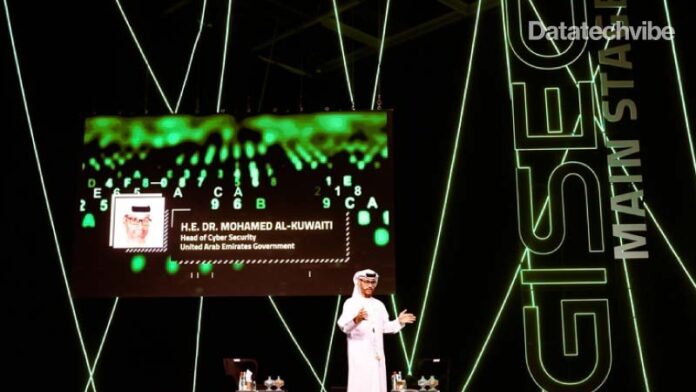The Dubai Electronic Security Centre (DESC) has launched a new cybersecurity platform, known as ‘TIRS’, which translates to ‘Shield’ in English, at GISEC 2021, the 9th edition of the Middle East and Africa’s most influential and connected cybersecurity event.
Speaking at the Government Stage, Ghaith Alsuwaidi, Deputy Director, Security Systems for DESC, unveiled the new platform which, designed entirely by a team of UAE nationals, scans Dubai government websites to detect vulnerabilities within departments, delivers top line data and issues a safety score out of five.
The platform also creates a threat report to inform participating entities on critical weaknesses, enabling them to take appropriate action to resolve any security gaps. Once the threat is identified and dealt with, DESC will confirm the action taken within the TIRS system.
“TIRS is one of the key pillars monitoring Dubai’s cyberspace, through the Dubai Cyber Index Platform. We continuously scan government websites and based on the security of the government entities we give them a score out of five. It ensures the security of government websites and introduces competitiveness in terms of website security, all the time making Dubai’s cyberspace safer,” said Alsuwaidi, adding that the TIRS scoring will be a parameter on the Dubai Cyber Index by the end of this year.
Meanwhile, Dr. Marwan Al-Zarouni, Director, Information Security Services, Dubai Electronic Security Centre (DESC), stressed that Dubai’s agility, emphasised by the launch of the TIRS platform, will enable Dubai to remain ahead of the curve in protecting its cyberspace.
“In Dubai we are not isolated from the world when it comes to regulation, and we participate in global programmes and contribute to policy making. We are one of the first cities to mandate that all cloud providers to any government bodies need to be compliant to our security standards,” said Al-Zarouni. “Being agile enough to change and create policy quickly to match new threats and trends is a key strength for us.
GISEC 2021 was kicked off in Dubai on May 31, which runs at Dubai World Trade Centre (DWTC) until 2nd June.
The event aims to outline the need for greater collaboration, knowledge sharing and trust building between public and private sectors to tackle increasingly innovative and sophisticated cybercriminals.
Dr. Mohamed Al-Kuwaiti, Head of Cyber Security, UAE Government, delivered the opening keynote of the 9th edition of GISEC, and reinforced that it is a case of when, not if, governments and corporations will fall victim to a cyberattack. However, he called for collaborative efforts to identify new threats, anticipate the severity of attacks and limit reputational and operational damage.
“Cybercriminals will still find creative ways to breach our systems and platforms, and we want to be able to detect those malicious activities early, proactively, take swift action and minimise the impact,” said Dr. Al-Kuwaiti in his opening address.
“Technology is only one solution. As threats become ever more sophisticated there is a need for international collaboration to govern behaviour in cyberspace and enhance the security and trust that is essential to the functioning of a global digital economy.
Dr. Al-Kuwaiti’s views were echoed by Craig Jones, Cybercrime Director, INTERPOL, who shared his experiences in an on-stage interview along with Colonel Saeed Al Hajri, Director, Cyber Crime Department, Dubai Police. Jones said that INTERPOL is working with countries to create knowledge sharing platforms in order to collaborate on best practices, and operations platforms to identify joint approaches that can monitor and eventually catch cybercriminals.
“We have to protect ourselves. We have to identify those vulnerabilities, share information, share trust in order to target criminals, impact them and prevent crime,” said Jones.
Jones gave insight into how public-private partnerships have produced positive results in Nigeria by collapsing a criminal network responsible for phishing attacks.
“We need that trust and to also work out how we change that policing model to a ‘dare to share’ approach,” added Jones.
Meanwhile, Aloysius Cheang, Chief Security Officer, Huawei UAE, stressed the need for cross-industry collaboration to enhance systematic cybersecurity governance and unify cybersecurity standards.
“The topic of building a trusted digital oasis has been a key theme for today and as mentioned by His Excellency Dr. Al-Kuwaiti, a joint approach is needed to protect our digital ecosystems. As societies have become increasingly dependent on the internet, new cybersecurity vulnerabilities have emerged. Companies, government entities and individuals can all fall prey to cyber threats. Collaboration between governments and private enterprises is key to address today’s cybersecurity challenges.”
Day two of GISEC witnessed the launch of an online competition for cybersecurity experts to build CERT capability and cyber resilience.
The Hunt 2021 Socathon will see 130 participants in 30 teams spanning 12 countries battle it out in a 24-hour contest. The challenge, enabled by Cyber Unit Technologies Training and Exercise Range, will see teams target cyber competencies in a real-world attack scenario on Security Operation Centres (SOC).
Also Read: Who’s Buying Who: Big Deals In Cybersecurity
UAE Cyber Resilience Report
UAE-based cybersecurity advisor, Digital14, launched its Cyber Resilience Report: The UAE Threat Landscape 2021, during GISEC.
Cyber defence experts evaluated and analysed multiple digital assets in the UAE to give an in-depth understanding of the country’s threat landscape.
Digital14’s research revealed an exponential surge in phishing and ransomware with 1.1 million phishing attacks in 2020. F
Joshua Knight, EVP Cyber Defence, Digital14, said, “Traditional cyber security approaches are no longer enough. Traditional perimeter-based network defence, for example, is obsolete. Not only does the perimeter no longer exist in our newly connected environments, but organisations must also recognise that their networks have most likely already been breached.”
Key findings include:
In 2020, 249,955 vulnerabilities were found in 800,315 unique instances
Significant numbers of old vulnerabilities, some dating back to 2000, have yet to be remediated within UAE organisations’ networks. These can easily provide an entry point for devastating cyberattacks
Ransomware increased with a 33 per cent rise in the number of new ransomware families compared with 2019









